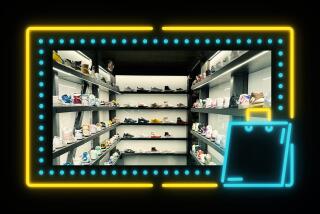A Lesson Learned From Enron: What You Can’t Shred, Sell
- Share via
HOUSTON — In a city where fortunes come and go, stylish debt management is a shameless art form. Take Linda Lay, the former first lady of Enron Corp., who’s now in the thrift store business. We’re talking salvation Armani here.
Her new Jus’ Stuff resale shop, expected to open here any day now, is stocked with furnishings from multimillion-dollar homes she and her husband, Kenneth L. Lay, have sold since the energy company collapsed.
In Texas, companies may fall, but people stand tall. The late, three-time Lone Star State Gov. John Connally, facing bankruptcy in 1988, set the gold standard when he entered an auction house to thunderous applause, sat second row center and signed autographs as the possessions of a lifetime were sold to the highest bidder.
In January, Linda Lay was on NBC’s “Today” show tearfully saying her family was near bankruptcy. Now dry-eyed since the sale of luxury vacation homes in Aspen, Colo. (a cottage went for $10 million), and another in Galveston, Texas, she is working with her daughter, Robin, on selling family castoffs--pre-owned furniture. “Linda decided it didn’t make sense to keep it all,” said family spokeswoman Kelly Kimberly. “It was just stuff, and someone else might have a use for it.”
The curious attracted to the Jus’ Stuff store find a firmly locked door with a handwritten note: “Jus’ sorting through our stuff. Thanks for stopping by.”
Still, some stop and peek between the window shades that shield the interior from view and a luxurious expanse of furniture appears: A mahogany canopy bed. A reproduction of an antique desk. Tables filled with picture frames and lamps. Rugs, glassware and ceramic rabbits.
Track lighting shines on carefully arranged vignettes throughout the store. A painting of Jesus rests against a mantle topped with a pair of folk art roosters. Elsewhere, a pile of gaily flowered pillows softens a set of bent willow chairs.
Not quite your taste? The store is also unloading home furnishings from friends of the couple.
Though the store is near the priciest homes in town, the Lays share the block with a crazy quilt of neighbors befitting a city that is still unzoned: Owners of 1940s bungalows live alongside a combination manicure-and-massage emporium, an electrical supply company and a junk shop that welcomes customers with a poster of the Fonz on the door and crushed beer cans on the walkway.
From his home across the street, Mark Parker has watched a parade of workers transform the Lays’ store, a former pet shop, from homely to modern. He winced when painters sanded off a favorite big red sign, “Kennel Town Meat Bar,” which always drew second glances. Fresh white paint went up, then a stark black awning.
Parker’s outdoor smoking breaks became infinitely more interesting when vans pulled up to unload the secondhand goods. “They own so many fine things, it’s high-end everything,” Parker said. “I don’t believe they’re broke,” he said, adding that the Lays still live in a home worth millions. “I don’t understand why they’re doing this.”
Still, he wouldn’t mind shopping there, if his budget allowed. “This is supposed to be a secondhand store, but it would take me six months to pay for anything in there.” Maybe Parker should ask if Jus’ Stuff offers a layaway plan.
A paint-spattered Bob Nelson, taking a break from the blazing afternoon sun, agreed. “It’s all real nice stuff in there,” said Nelson, who helped knock down and paint walls inside the store. “There’s a lot of it in there, stacked up high. I can’t afford any of it.”
Kimberly said that though pricing is not complete, “I would think there would be something affordable for various price ranges. They had some small items--there were things like a set of brightly colored dishes.”
Outsiders are banned until the store opens. If the drawn shades don’t convey the message, the constant presence of a Houston police cruiser in the parking lot does.
“If I were the Lays, I’d be afraid and call the police, too,” said a shop owner down the street. “I think it’s terrible what they did to those people at Enron.
“I’ll be surprised if anybody buys their things, though you always have people who want a souvenir of a tragedy.”
Whether the Lay name attracts or deters business is moot, said Parker. “The rich run in a tight crowd here. You’d just about have to kill someone to get kicked out. They’ll buy the stuff if no one else will.”
Times staff writer Michael Quintanilla contributed to this article.


